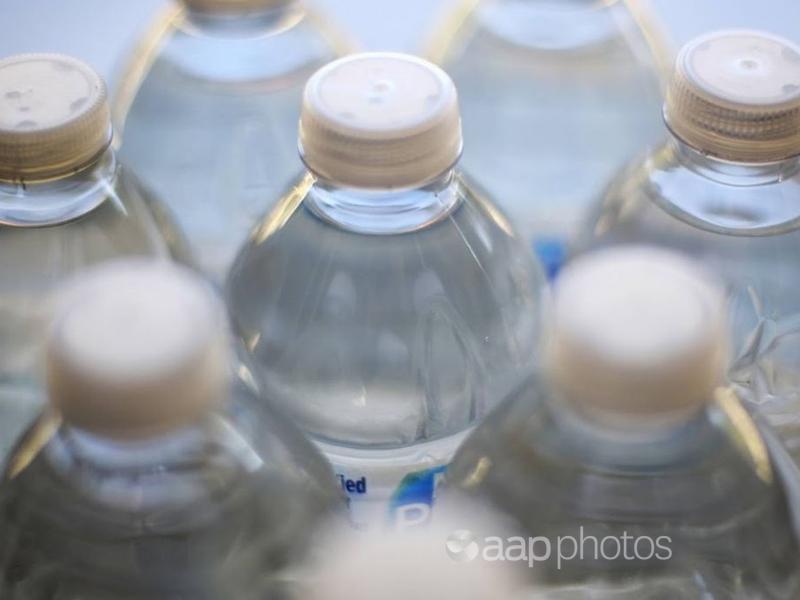The Statement
AAP FactCheck examined a Facebook post from October 5, 2019 on the page WeAreTeens which features a screenshot of a tweet. Under a caption saying “Don’t leave water in the car!!” is an image of a notice with a headline: “Bottled Water in Your Car Is Very Dangerous”.
The notice shows two pictures of bottled water inside a car and reads: “Bottled water in your car is very dangerous! On the Ellen show, Sheryl Crow said that this is what caused her breast cancer. It has been identified as the most common cause of the high levels of dioxin in breast cancer tissue. Sheryl Crow’s oncologist told her: women should not drink bottled that has been left in a car. The heat reacts with the chemicals in the plastic of the bottle which releases dioxin into the water. Dioxin is a toxin increasingly found in breast cancer tissue. So please be careful and do not drink bottled water that has been left in a car.”
The US-based group WeAreTeens created their Facebook page in 2012 and describes itself as “an independent business organization centered around keeping our clientele up to date on trending media”. Fiverr, a freelance services platform, lists WeAreTeens as “an independent business organization promoting influencer media”.
The post, which has been shared by Australian users, has generated more than 7500 shares and received at least 2500 reactions and 3100 comments.

The Analysis
The origins of the bottled water post can be traced back to at least 2004.
That year Dr Rolf Halden, then an assistant professor in the Department of Environmental Health Sciences and Center for Water and Health at the Johns Hopkins Bloomberg School of Public Health in Baltimore, USA, addressed the claims made in a hoax email linking dioxins and freezing water in plastic bottles.
In a Q&A on the Johns Hopkins website, Dr Halden said dioxins are “organic environmental pollutants sometimes referred to as the most toxic compounds made by mankind”. He said a significant source of dioxins are “various combustion processes, including natural events such as wildfires and even volcanic eruptions”.
Dr Halden said freezing acts against the release of chemicals but also said that “there are no dioxins in plastics”. Dr Halden said people are primarily exposed to dioxins mostly from eating meat and fish rich in fat, after fish and animals take up dioxin from the environment and store it in their body fat.
“People should be more concerned about the quality of the water they are drinking rather than the container it’s coming from,” he said.
Dr Halden said heating of plastic could result in chemicals called phthalates leaching into water or food.
“There is another group of chemicals, called phthalates that are sometimes added to plastics to make them flexible and less brittle. Phthalates are environmental contaminants that can exhibit hormone-like behavior by acting as endocrine disruptors in humans and animals. If you heat up plastics, you could increase the leaching of phthalates from the containers into water and food,” he said.
AAP FactCheck was unable to find evidence of US rock singer Sheryl Crow talking about bottled water and any associated risk on the Ellen talk show. Crow did appear on the US TV show in October, 2008 but did not talk about her breast cancer.
Crow did, however, post a warning on her website in September 2006 that said: “Don’t drink water from a bottle that has been sitting in your car. Heated plastic will bleed toxic substances that can be carcinogenic.”
The Cancer Council NSW addressed the claims about water in plastic bottles on its website, stating there is “no convincing scientific evidence to support the claim that plastic bottles cause cancer”.
The Cancer Council also noted that “it is not clear if plastics used in water bottles contain dioxins and there is no evidence that dioxins are produced when plastics are heated as opposed to burned in an incinerator”.
The Cancer Council stated the International Agency for Research on Cancer (IARC) had found all but one dioxin could not be classified with respect to its cancer risk for humans .
One form of dioxin, 2,3,7,8- tetrachlorodibenzo para dioxin or TCDD, was identified in 1997 as carcinogenic to humans but the Cancer Council states it does not pose a risk with regard to plastic bottles.
The World Health Organization, in a 2016 fact sheet titled ‘Dioxins and their effects of Human Health’ noted that TCDD was classified by the International Agency for Research on Cancer as a “known human carcinogen”. However, TCDD does not affect “genetic material” and that normal exposure to dioxins was “not expected to affect human health on average”.
The Cancer Council said the Australian New Zealand Food Standards Code states that it is “safe to re-use plastic bottles as long as their condition has not deteriorated and they can be cleaned to avoid health risks associated with bacteria growing in them”.
It also said it was “important to note that potential health risks from heating plastics requires temperatures substantially higher than temperatures reached inside a car in the Australian summer.
The Verdict
AAP FactCheck found Sheryl Crow did urge people not to drink bottled water that had been left in a car on her website but there is no evidence the singer spoke about the issue on the Ellen show.
Regarding the link between bottled water in cars and cancer, Cancer Council NSW says there is no scientific evidence to support this claim. The claim that dioxin leaches from plastic bottles into water in cars was addressed as long ago as 2004 by Dr Rolf Halden, who said there are no dioxins in plastics. Dr Halden did note that heating plastic containers could release another kind of chemical, called phthalates.
False – The primary claims of the content are factually inaccurate.
First published November 22, 2019, 17:28 AEDT


















